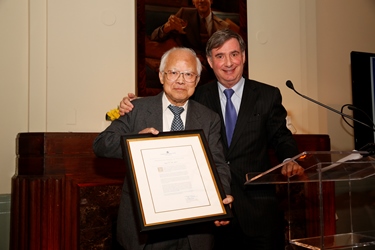Alumni Association Activities 2014
New Students Welcomed with Stethoscopes
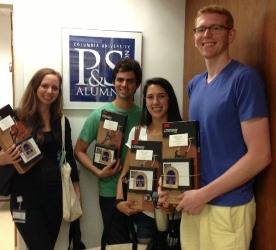
Smiling members of the Class of 2017 filed into the P&S Alumni Association office in August 2013 to lend an ear. They picked up their new stethoscopes, all paid for through donations by alumni. The symbolism was not lost on one proud student who remarked in passing, "It's not just a device, it's the heartbeat of P&S."
Alumni Council Dinners
Following a longstanding tradition launched by the late Dr. Harold Brown, a popular professor of tropical medicine at P&S who encouraged his students to pursue firsthand experience abroad, guest speakers who crossed intellectual and geopolitical borders in the 2013-14 academic year kept council audiences riveted.
At the council dinner on Sept. 19, 2013, Stephen Nicholas, MD, associate dean for admissions at P&S, focused on the medical and educational importance of another aspect of his diverse activities, his role as founding director of the International Family AIDS Program Global Health Program in the Dominican Republic.
"Unlike now, when a full two-thirds of arriving medical students say they expect some international experience and over half will actually achieve it," when he was pursuing his training in the early 1980s, he recalled, "only 6 percent of medical students and nearly no residents got international health experience." He began his council talk by recounting his own experience as a fledgling pediatrics intern at Harlem Hospital in the early 1980s at the onset of the AIDS epidemic. Faced with a health crisis of unprecedented proportions, Dr. Nicholas, under the direction of Dr. Margaret Heagarty, then head of pediatrics at Harlem Hospital, helped launch the first pediatric AIDS program in 1985. Working in conjunction with Drs. Wafaa El-Sadr and Elaine Abrams, he co-founded the Harlem Family Care Center. Leaving the "safety zone of the hospital wards," he and his colleagues worked out a community-based approach and a drug regimen that eventually helped reduce the mother-to-baby HIV transmission rate from up to 50 percent to less than 1 percent.
Ever the medical pedagogue, he reported that the project proved not only successful, but also "a wonderful setting for educating students."
In 1999, Dr. Nicholas founded the International Family AIDS Program (now called the IFAP Global Health Program), applying the care model developed in Harlem to the Dominican Republic, which at the time along with its island neighbor, Haiti, had among the world's highest prevalence of individuals infected with HIV. Setting up a base of operations in La Romana, he and his team helped reduce the mother-to-child transmission rate from the national average of 15.1 percent to 3.3 percent.
"Very early on," he said, "we began to develop student rotations. We now have year-round, short-term, and long-term clinical, public health, and research opportunities for students from all four schools on campus." Since 2002, he added, more than 90 P&S students have spent time at La Romana.
"I know that I am a better doctor because of my involvement in global health," Dr. Nicholas concluded, "and I know that P&S students have also benefited significantly. With our help, some of our students will be the next global health leaders, and the world will be a better place."
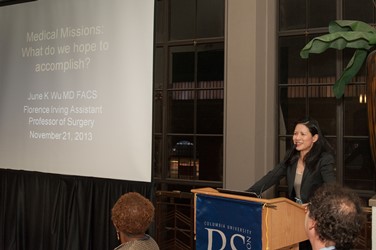
In November 2013, Alumni Association president Neil Freeman'85 began the council meeting by calling for a moment of silence to remember Richard J. Stock'47, a past Alumni Association president, longstanding chair of the annual fund, and P&S alumni historian, who died Nov. 7. "Dick Stock helped set the gold standard for clinical care at P&S," Dr. Freeman recalled, adding that the dean, Lee Goldman, saluted Dr. Stock when he turned 90 as "the epitome of the P&S physician, the model MD that generations of clinicians have tried to live up to and emulate."
The evening's guest speaker was June K. Wu'96 (above), assistant professor of surgery at P&S and attending surgeon at NewYork-Presbyterian Hospital, introduced by Dr. Freeman as "one of our rising stars in pediatric plastic surgery." In remarks titled "Medical Mission: What Do We Hope to Accomplish?" Dr. Wu spoke of her ongoing commitment to the care of children in China to repair their craniofacial deformities and her long-time experience with the cultural, medical, and logistical challenges of medical missions.
She spoke of a profound gratification in providing care to an underserved population that would not otherwise receive treatment, but she cautioned that the mission should not just be "about providing care to patients. Education must be an important part of care. You have to work with local physicians to teach them how to do it themselves. Scarce medical resources can be spent in a more medically efficient manner," she said, "if you train locals to perform the surgery."
Addressing the inevitable limitations of performing surgery in settings abroad, Dr. Wu said, "We try as best we can to replicate standards we have in this country." She carefully assessed the pros and cons of such missions. On the plus side, they offer training, education, and productive interaction with other physicians, "who learn from each other." But she also stressed the need to avoid a sense of "medical colonialism" and that colleagues and students participating in the mission not view the experience as a "surgical safari."
In early 2014, guest speaker and host Lee Goldman delivered his traditional update at the annual dean's dinner. Dr. Goldman outlined the progress of various initiatives, including the new curriculum. "This is now, as you know, the second class to reach its fourth year in the new curriculum," he said. "So far, board scores have been the highest we've ever seen. I want to give a lot of credit to the faculty who have been responsible for making this new curriculum a success. The scholarly project is a critical part of what we consider to be a P&S education in 2014. And while we recognize that not everybody is going to go into a research career, we do believe that the scholarly endeavor will fundamentally change the experience that our students have and the way they go about their entire medical careers."
On the clinical side, Dr. Goldman reported that "the volume of patients seen by our faculty at P&S is up by almost 10 percent over last year. At our new location at 51st Street across from Rockefeller Center our patient volumes are running roughly 25 percent over the volumes we saw at East 60th Street." A major addition to the clinical venture is the new bone marrow transplant unit, a state of the art facility, for which he thanked the generosity of Herbert and Florence Irving.
On a more sober, albeit still hopeful, note, Dr. Goldman reported that the sequestration in the federal budget meant that extramural NIH grants declined by 6 percent. "The good news is that for the fifth year in a row we beat the market; we went down by only 4 percent. The bad news, of course, is that we still went down by 4 percent." With basic science departments at Columbia and peer institutions around the country under particular stress because they do not have clinical revenue, Dr. Goldman says plans are in place at P&S "that we believe will sustain the size and the efforts of our basic science departments."
"Under the able leadership of Amelia Alverson and Anke Nolting, our philanthropy is better than ever," he added. "For the third consecutive year we passed $200 million in gifts to P&S. That consistently places us in the lead among medical schools. We are very grateful to our alumni and to other donors, including grateful patients who help make this whole place work."
Dr. Goldman also addressed the physical plant. "It's always a challenge talking with alumni who have wonderful memories of these old buildings," he said. "We tend to remember things the way they were when we experienced them and sometimes have trouble seeing what they look like today. We believe that a physical overhaul of this campus is critical." Construction has begun on the new medical and graduate education building, which he predicts will be "a truly iconic building and a game-changer for the campus." Other projects in the works include a new nursing building behind the Berrie Center, which when completed in 2016 will free up the site of the Georgian Building on 168th Street for a new facility. In addition to a variety of campus improvements and beautification projects planned in conjunction with NewYork-Presbyterian Hospital, he said, discussions are under way with developers to create new housing near the campus, especially for graduate, nursing, and public health students.
"Our motto is to make this a destination campus—for patients, their families, and our students and faculty, to make it feel like the kind of campus that a great hospital and a great university should have in the 21st century. Now is really a time," he added, "to make a major commitment toward what we and our successors deserve."
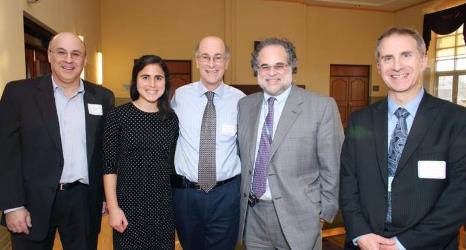
Grodman Dual Degree Program
In an informal give-and-take on Oct. 2, 2013, in Bard Hall, Fred Cohen, MD, DPhil, partner and managing director of TPG Biotechnology, broadened the career horizons of interested students. Dr. Cohen's participation was part of the Grodman Dual Degree Program, established with the generous support of Marc D. Grodman'77, chair of the board, president, and CEO of Bio-Reference Labs, a company he founded. Dr. Grodman is also a member of the clinical faculty in the Department of Medicine at P&S. The Grodman program funds lectures and seminars to support students interested in dual degrees, particularly the joint MD/MBA at Columbia.
CUMC Health Care Forum on the Affordable Care Act
A panel of distinguished health care professionals gathered in October 2013 in Bard Hall to discuss "The Affordable Care Act: Impact on Practitioners and Patients." The panelists were Peter W. Carmel, MD, MSD'70, immediate past president of the American Medical Association; Christian S. Stohler, DMD, DrMedDent, dean of Columbia's College of Dental Medicine and senior vice president of Columbia University Medical Center, who also acted as master of ceremonies; Burton L. Edelstein, DDS, professor of dental medicine and of health policy and management at Columbia; John Rowe, MD, professor of health policy and management at the Mailman School of Public Health; Arlene Smaldone, PhD, associate professor of nursing and assistant dean for scholarship and research at the Columbia School of Nursing; and Ross A. Frommer, JD, vice president and associate dean at P&S. Lee Goldman, MD, EVP and dean, delivered welcoming remarks and introduced the distinguished speakers.
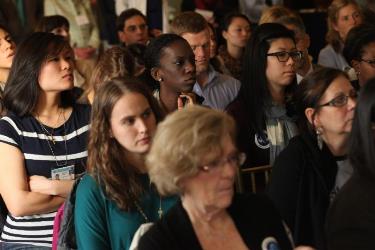 "Rarely in the history of the U.S. has there been a bill so demonized as the Affordable Care Act, and many Americans, knowing nothing about the act, feel that they're against it," said Dr. Carmel. Furthermore, he warned that if young healthy individuals failed to register in sufficient numbers, it would drive up the cost of insurance for everyone. Mr. Frommer regretted that large numbers of uninsured individuals who would otherwise benefit would still not be able to attain coverage because the governors of the states in which they live chose not to expand their Medicaid programs. Dr. Edelstein pointed out that no adults would be covered for oral health care under the Affordable Care Act but welcomed the fact that the act "firmly places dental care for children in the context of well child care." Dr. Smaldone said that in states that have chosen to expand Medicaid programs, "childless adults, many of whom have not had insurance, will be covered and so will benefit the most." Concurring with Dr. Carmel, Dr. Rowe insisted that "the risk pool needed to be balanced" for the program to work as planned. Dr. Rowe regretted that many healthy young people were simply not well informed about the Affordable Care Act. As a result, he predicted, "one of two things will happen. Either the insurance rates will increase rather significantly or the number of insurers who offer policies in the exchanges will fall." Consequently, he said, "choice is going to disappear in a lot of locales."
"Rarely in the history of the U.S. has there been a bill so demonized as the Affordable Care Act, and many Americans, knowing nothing about the act, feel that they're against it," said Dr. Carmel. Furthermore, he warned that if young healthy individuals failed to register in sufficient numbers, it would drive up the cost of insurance for everyone. Mr. Frommer regretted that large numbers of uninsured individuals who would otherwise benefit would still not be able to attain coverage because the governors of the states in which they live chose not to expand their Medicaid programs. Dr. Edelstein pointed out that no adults would be covered for oral health care under the Affordable Care Act but welcomed the fact that the act "firmly places dental care for children in the context of well child care." Dr. Smaldone said that in states that have chosen to expand Medicaid programs, "childless adults, many of whom have not had insurance, will be covered and so will benefit the most." Concurring with Dr. Carmel, Dr. Rowe insisted that "the risk pool needed to be balanced" for the program to work as planned. Dr. Rowe regretted that many healthy young people were simply not well informed about the Affordable Care Act. As a result, he predicted, "one of two things will happen. Either the insurance rates will increase rather significantly or the number of insurers who offer policies in the exchanges will fall." Consequently, he said, "choice is going to disappear in a lot of locales."
The event was co-sponsored by the Columbia Alumni Association and the P&S Alumni Association in conjunction with Columbia Giving Day and streamed live to Columbia University alumni all over the world. The panel also responded to questions submitted by viewers.
P&S Student/Alumni Forum
In November 2013, Thomas Sculco'69, surgeon-in-chief of the Hospital for Special Surgery, spoke informally to students about his life's work as a renowned authority on total hip and knee replacement. Dr. Sculco has spent his entire career at HSS, one of the foremost orthopedic facilities in the nation and the world.
CLYDEfest: A Salute to Clyde Y.C. Wu'56
Outside it was one of the coldest days of the year, the thermometer dropping to 8 degrees Fahrenheit. But the warmth inside was palpable on Jan. 7, 2014, as faculty, alumni, several Columbia University trustees, family, and P&S friends gathered in Bard Hall for a dinner celebrating the life and prodigious accomplishments of philanthropist Clyde Y.C. Wu'56.
"This is going to be a very warm evening, despite the Arctic temperature outside," said host Lee Goldman, P&S dean, reflecting on his own personal fondness for Dr. Wu and gratitude for his exceptional generosity to P&S. Dr. Goldman is photographed with Dr. Wu above.
Also on hand was Columbia University President Lee Bollinger, who addressed the guest of honor, a Columbia University trustee emeritus: "The only thing to say is how much we love Helen and Clyde." President Bollinger joked that "Clyde holds the record for the longest (and most thorough) committee meetings of any trustee."
Dr. Goldman invited Dr. Wu to the podium to accept a certificate inducting him into the Honorary Order of Fellows. "You join a great tradition of philanthropists who have helped build this institution into what it is today. You astound us with your multifaceted support of P&S." Dr. and Mrs. Wu's philanthropic largesse to the medical school has included the endowment of four Wu professorships, establishment of the Wu Center for Molecular Cardiology, a program of scientific and cultural exchange with Dr. Wu's native China, generous support of scholarship and loan funds, the refurbishment of a music room and of the legendary Rachmaninoff piano in Bard Hall, and, most recently, a major commitment toward establishment of a new Wu Global Health Center at P&S. "My relationship with Columbia P&S started in the fall of 1951 when I was advised I would have an interview with Dean Aura Severinghaus," recalled Dr. Wu. As it turned out, Dr. Severinghaus had previously been a member of the faculty at Peking Union Medical College in Beijing and shared fond memories with the applicant and expressed his great respect for Chinese culture.
As a tribute to Dr. and Mrs. Wu's great love of music, several students and alumni, Elliott Huang'15, June Wu'96, Hanjay Wang'15, and Peter Liou'13, rolled out the Rachmaninoff piano and raised other instruments in rousing renditions of music by Brahms and Schubert.
- Log in to post comments


